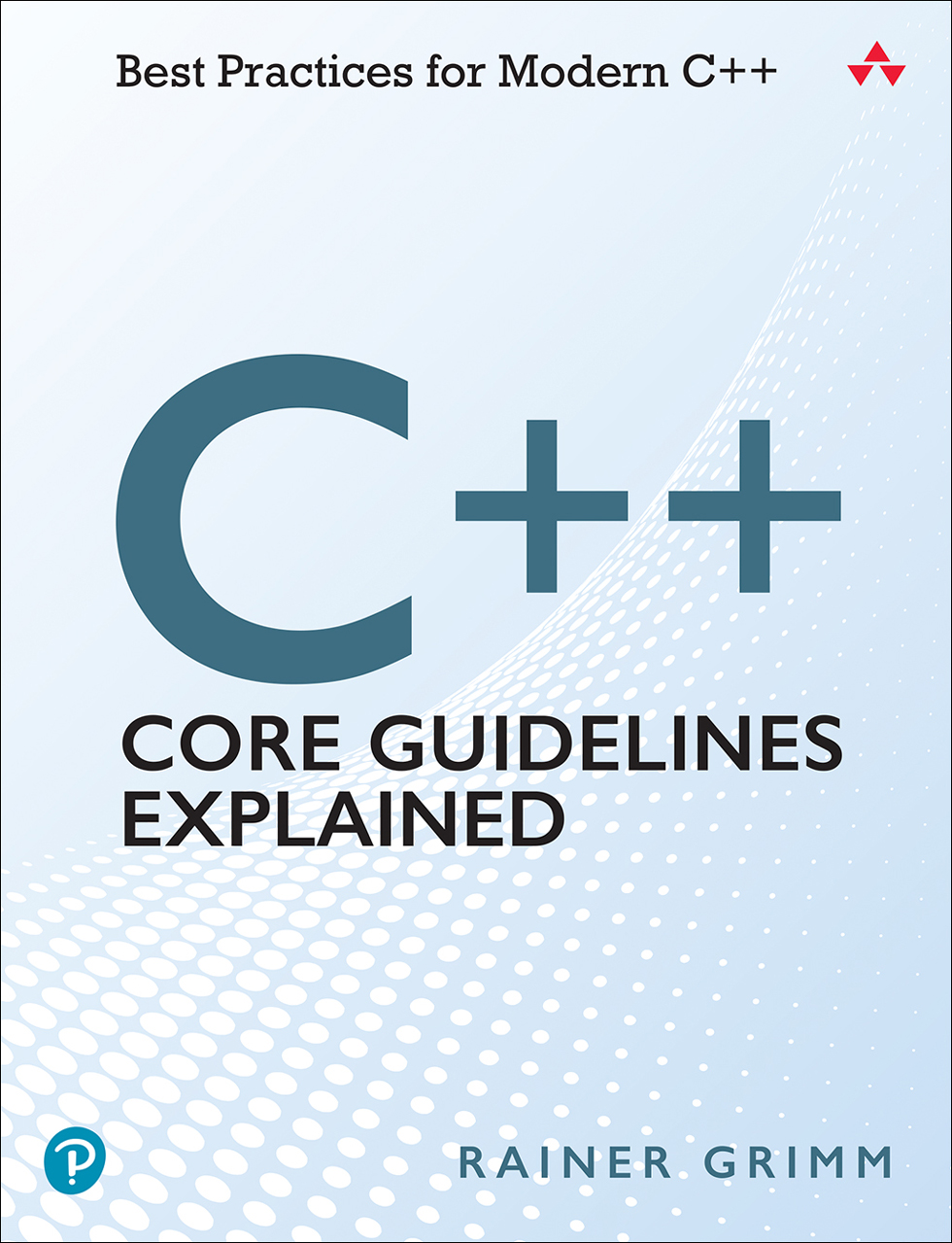Rainer Grimm - C++ Core Guidelines Explained: Best Practices for Modern C++
Here you can read online Rainer Grimm - C++ Core Guidelines Explained: Best Practices for Modern C++ full text of the book (entire story) in english for free. Download pdf and epub, get meaning, cover and reviews about this ebook. year: 2022, publisher: Addison Wesley, genre: Computer. Description of the work, (preface) as well as reviews are available. Best literature library LitArk.com created for fans of good reading and offers a wide selection of genres:
Romance novel
Science fiction
Adventure
Detective
Science
History
Home and family
Prose
Art
Politics
Computer
Non-fiction
Religion
Business
Children
Humor
Choose a favorite category and find really read worthwhile books. Enjoy immersion in the world of imagination, feel the emotions of the characters or learn something new for yourself, make an fascinating discovery.

- Book:C++ Core Guidelines Explained: Best Practices for Modern C++
- Author:
- Publisher:Addison Wesley
- Genre:
- Year:2022
- Rating:5 / 5
- Favourites:Add to favourites
- Your mark:
- 100
- 1
- 2
- 3
- 4
- 5
C++ Core Guidelines Explained: Best Practices for Modern C++: summary, description and annotation
We offer to read an annotation, description, summary or preface (depends on what the author of the book "C++ Core Guidelines Explained: Best Practices for Modern C++" wrote himself). If you haven't found the necessary information about the book — write in the comments, we will try to find it.
C++ Core Guidelines Explained: Best Practices for Modern C++ — read online for free the complete book (whole text) full work
Below is the text of the book, divided by pages. System saving the place of the last page read, allows you to conveniently read the book "C++ Core Guidelines Explained: Best Practices for Modern C++" online for free, without having to search again every time where you left off. Put a bookmark, and you can go to the page where you finished reading at any time.
Font size:
Interval:
Bookmark:

ePUB is an open, industry-standard format for eBooks. However, support of ePUB and its many features varies across reading devices and applications. Use your device or app settings to customize the presentation to your liking. Settings that you can customize often include font, font size, single or double column, landscape or portrait mode, and figures that you can click or tap to enlarge. For additional information about the settings and features on your reading device or app, visit the device manufacturers Web site.
Many titles include programming code or configuration examples. To optimize the presentation of these elements, view the eBook in single-column, landscape mode and adjust the font size to the smallest setting. In addition to presenting code and configurations in the reflowable text format, we have included images of the code that mimic the presentation found in the print book; therefore, where the reflowable format may compromise the presentation of the code listing, you will see a Click here to view code image link. Click the link to view the print-fidelity code image. To return to the previous page viewed, click the Back button on your device or app.
Best Practices for Modern C++
Rainer Grimm

Boston Columbus New York San Francisco Amsterdam Cape Town
Dubai London Madrid Milan Munich Paris Montreal Toronto Delhi Mexico City
So Paulo Sydney Hong Kong Seoul Singapore Taipei Tokyo
Cover image: SVPanteon/Shutterstock
Author photo on page xxix: Karin Ruider
Cippi illustrations on pages 3, 7, 15, 27, 53, 131, 139, 165, 213, 231, 279, 293, 301, 375, 383, 397: Beatrix Jaud-Grimm
: Howard Hinnant
: Matt Godbolt
: Microsoft Corporation 2021
: Screenshot of Konsole KDE
: Screenshot of ThreadSanitizer Google LLC
Many of the designations used by manufacturers and sellers to distinguish their products are claimed as trademarks. Where those designations appear in this book, and the publisher was aware of a trademark claim, the designations have been printed with initial capital letters or in all capitals.
The author and publisher have taken care in the preparation of this book, but make no expressed or implied warranty of any kind and assume no responsibility for errors or omissions. No liability is assumed for incidental or consequential damages in connection with or arising out of the use of the information or programs contained herein.
For information about buying this title in bulk quantities, or for special sales opportunities (which may include electronic versions; custom cover designs; and content particular to your business, training goals, marketing focus, or branding interests), please contact our corporate sales department at or (800) 382-3419.
For government sales inquiries, please contact .
For questions about sales outside the U.S., please contact .
Visit us on the Web: informit.com
Library of Congress Control Number: 2022930162
Copyright 2022 Pearson Education, Inc.
The C++ Core Guidelines are copyright Standard C++ Foundation and its contributors.
All rights reserved. This publication is protected by copyright, and permission must be obtained from the publisher prior to any prohibited reproduction, storage in a retrieval system, or transmission in any form or by any means, electronic, mechanical, photocopying, recording, or likewise. For information regarding permissions, request forms and the appropriate contacts within the Pearson Education Global Rights & Permissions Department, please visit www.pearson.com/permissions/.
ISBN-13: 978-0-13-687567-3
ISBN-10: 0-13-687567-X
ScoutAutomatedPrintCode
Pearson is dedicated to creating bias-free content that reflects the diversity of all learners. We embrace the many dimensions of diversity, including but not limited to race, ethnicity, gender, socioeconomic status, ability, age, sexual orientation, and religious or political beliefs.
Education is a powerful force for equity and change in our world. It has the potential to deliver opportunities that improve lives and enable economic mobility. As we work with authors to create content for every product and service, we acknowledge our responsibility to demonstrate inclusivity and incorporate diverse scholarship so that everyone can achieve their potential through learning. As the worlds leading learning company, we have a duty to help drive change and live up to our purpose to help more people create a better life for themselves and to create a better world.
Our ambition is to purposefully contribute to a world where:
Everyone has an equitable and lifelong opportunity to succeed through learning.
Our educational products and services are inclusive and represent the rich diversity of learners.
Our educational content accurately reflects the histories and experiences of the learners we serve.
Our educational content prompts deeper discussions with learners and motivates them to expand their own learning (and worldview).
While we work hard to present unbiased content, we want to hear from you about any concerns or needs with this Pearson product so that we can investigate and address them.
Please contact us with concerns about any potential bias at https://www.pearson.com/report-bias.xhtml.
C++ is a very rich, very expressive language with lots of features. It has to be because a successful general-purpose programming language must have more facilities than any one developer needs, and a living and evolving language will accumulate alternative idioms for expressing an idea. That can lead to choice overload. So, what does a developer choose for programming style and mastery? How does a developer avoid getting stuck with outdated and ineffective techniques and programming styles?
The C++ Core Guidelines (https://github.com/isocpp/CppCoreGuidelines/blob/master/CppCoreGuidelines.md) are an ongoing open-source project to address such issues by gathering widely recognized modern C++ best practices together in one place. The Core Guidelines rely on decades of experience and earlier sets of coding rules. They share a conceptual framework with C++ itself, with a focus on type safety, resource safety, and the elimination of avoidable complexities and inefficiencies. The Core Guidelines are organized to address known problem areas and partly phrased to enable enforcement by a static analyzer.
The Core Guidelines are organized as a reference work to make it easy to look up and share specific topics, not as a tutorial to be read sequentially to learn themes for using modern C++ well. We are therefore very pleased to see Rainer Grimm applying his teaching skills and industrial background to tackle the hard and necessary task of making the rules accessible to more people. We hope that you find learning the Core Guidelines stimulating and, especially, that applying them to your real-world problems will make your work significantly more effective and more enjoyable.
Font size:
Interval:
Bookmark:
Similar books «C++ Core Guidelines Explained: Best Practices for Modern C++»
Look at similar books to C++ Core Guidelines Explained: Best Practices for Modern C++. We have selected literature similar in name and meaning in the hope of providing readers with more options to find new, interesting, not yet read works.
Discussion, reviews of the book C++ Core Guidelines Explained: Best Practices for Modern C++ and just readers' own opinions. Leave your comments, write what you think about the work, its meaning or the main characters. Specify what exactly you liked and what you didn't like, and why you think so.




